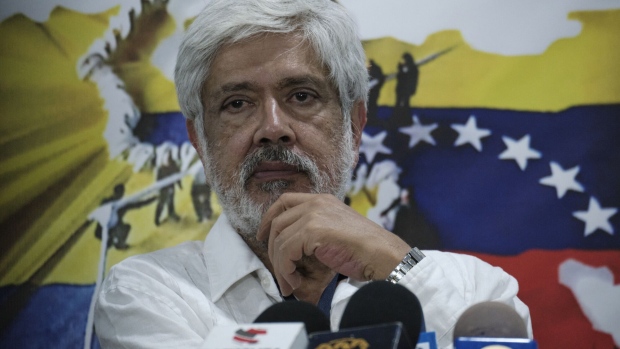Apr 8, 2024
Venezuela Talks With Colombian Firms Over Chavez-Era Asset Seizures
, Bloomberg News

(Bloomberg) -- The socialist government of Venezuela is discussing compensation with at least two Colombian companies whose assets were seized under late President Hugo Chávez.
Colombia’s largest cement maker, Cementos Argos SA, is in talks involving the possible takeover of a state-owned cement plant near Venezuela’s Caribbean coast, according to German Umaña, Colombia’s minister of commerce, trade and tourism.
An expropriated subsidiary of Cali-based sugar exporter Comercializadora Internacional de Azúcares y Mieles, Ciamsa, is also in negotiations for compensation, Umaña said.
After years of tension, relations between the countries improved after Gustavo Petro won Colombian presidency in 2022 and immediately restored ties and reopened the border. Venezuela seems to want to resolve these commercial disputes without a legal battle, Umaña said last week, in an interview at his office in Bogotá.
Umaña, who previously headed the Colombian-Venezuelan chamber of commerce, said that he had helped with the discussions.
Chávez ordered hundreds of expropriations during his 1999-2013 presidency, from cattle ranches and food factories to parking lots and insurance companies, in line with his socialist vision of increasing the role of the state in the economy.
Cementos Argos’s plant in western Venezuela was seized in 2006, while Ciamsa had a sugar mill in Venezuela’s Tachira state expropriated in 2010.
Now, after years of mismanagement, many of the expropriated companies are either shuttered, idle or working at a fraction of their capacity. Saddled with hundreds of failed state companies and seeking to reactivate the nation’s economy, Venezuelan President Nicolás Maduro has handed control of some of them to private partners and even reversed some of the Chávez-era seizures.
Venezuela’s information ministry did not immediately respond to a request for comment.
Read More: Bankrupted by Socialism, Venezuela Cedes Control of Companies
Near the Coast
Cementos Argos’s acquisition of an operation near the Venezuelan coast would potentially facilitate exports to the US. The company is applying for a US license that would allow it to receive the asset as payment from the Maduro government without breaching sanctions, said a person with direct knowledge of the deal who is not authorized to discuss the details publicly.
Cementos Argos, which trades on the benchmark Colcap index, controls 35% of Colombia’s cement market, and recently also became fourth-biggest producer in the US after combining its operations with Summit Materials earlier this year.
Venezuelan cement production has dwindled since Chávez took over virtually the entire industry in the late 2000s. Unlike other foreign companies operating in the sector, Cementos Argos was never compensated, said the firm’s CFO Felipe Aristizábal, who also confirmed the talks.
Ciamsa didn’t immediately reply to written requests for comment. Umaña didn’t say whether negotiations included retaking control of the expropriated mill, or a different asset.
Investment Protection
Colombian investors have been wary of returning to Venezuela since relations improved. Umaña said a bilateral treaty of investment protection should be approved by Colombia’s congress in the first half of the year.
“The treaty of investment protection, if approved, will give security because there are going to be international arbitration courts to resolve conflicts,” Umaña said. “That’s why a lot of Colombian investors are waiting for ratification of that treaty.”
He also expects trade between the two countries to double to around $1.4-1.5 billion this year, though that’s still down about 75% from its peak in 2008.
©2024 Bloomberg L.P.






